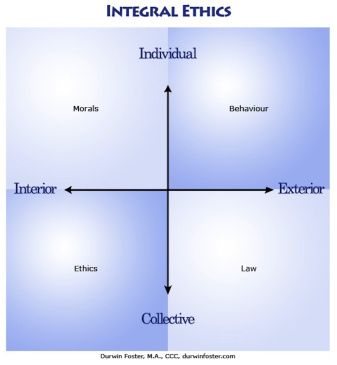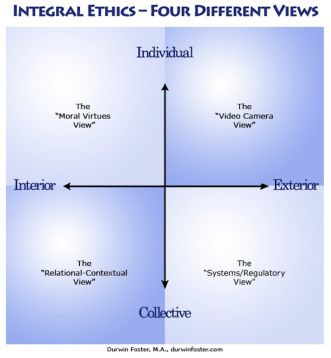As a member of the Ethics board, I wanted to cross-post here a blog that has been posted on the MindBody Medicine Network where I will be conducting a webinar on Sunday on the topic of integral ethics. The webinar is specifically focused on ethical dilemmas faced by healthcare professionals. However, the integral ethics model that I developed in conjunction with Dr. Tim Black from University of Victoria, and under supervision from Ken Wilber, founder of Integral Institute, is a general decision-making process that can be more broadly applied.
Any comments or questions could be sent directly to me at [email protected].
Here is the article:
A Brief Introduction to the Practice of Integral Ethics for Healthcare Professionals: Honoring the Ken Wilber Model
(The author, Durwin Foster, M.A. is a Canadian Certified Counselor, Researcher and Professional Presenter who has worked directly with Ken Wilber, a pioneer of integral theory)
In this article, I will provide a brief introduction to the practice of integral ethics for healthcare professionals.
One way to define the word “integral” is as “comprehensive.” Therefore, the benefit of taking an integral approach to the ethical dilemmas we may face as healthcare professionals is that an integral approach allows us to honor the complexity of the situations we face. When we make decisions that embrace and honor complexity, we are more likely to experience positive outcomes for both us and our clients.
The integral ethical-decision making model and process that Dr. Tim Black and I developed, with guidance from Ken Wilber, facilitates the wise embrace of complexity by parsing ethics into four key domains that correlate to the interior and exterior of reality, as well as its individual and collective aspects. Analyzing ethics in this way gives us ethics itself, as well as morals, behaviors and laws. The relationship between these four domains is perhaps best understood with the assistance of visuals, as follows:
The integral ethical-decision making process then guides you through the four domains using four different lenses in order to make an optimal decision in resolution of any ethical quandary you may be facing. Here are the lenses:
Here is an illustrative example:
I am at my workplace as an Employee Assistance Counsellor where the context requires me to keep in mind multiple clients, not only including my immediate client who is the person sitting in front of me, but also the client’s employer is a client of my employer. This creates a complex stakeholder arrangement which can lead to tricky ethical decision-making.
Then let us say I have a client who brings up a case of bullying by her manager. This client is regularly being “put down” in a way that she experiences as demeaning. She has become depressed and her health is suffering as she is eating less and sleeping more fitfully. She wants to speak up for herself in a straightforward way, but fears that doing so may jeopardize her job. The situation is serious enough that she has started looking for other work, but has not yet been successful in finding alternative employment.
Trained in social justice and advocacy work, my first desire — coming from the moral virtues view — is to do what is right. The client ought to be able to go to her Human Resources department, file a complaint, and something should be done by Human Resources to reprimand the manager. Right?
However, in looking through the systems-regulatory view that both she and I are members of, the reality becomes clear of how difficult this could be to enact without putting both of us at considerable risk. By working through all four lenses, I decide to focus on the power of relationship — the “relational-contextual view” — to assist this client. I surmise that by building a strong relationship of mutual trust, unconditional positive regard, and “mattering”, I can support her to maintain her self-esteem in this challenging situation. Also, I can support her by giving her specific behaviors — called the “video-camera view” because behavior is observable – to try out around assertiveness and non-violent communication that she can use to “test the waters” with her manager.
I trust the above overview of two of the main components of the integral ethical-decision making model, as well as an example of the model being applied, helps to wet your appetite for learning more about how this model can help you serve your clients and patients in the most ethical manner possible. You can participate in “the rest of the story” by registering for my Mind Body Medicine Network’s webinar on Sunday, August 25th from 7:00 p.m. to 8:30 p.m.. on “Integral Ethics for Health and Helping Professionals.” The webinar will be interactive and participants are welcome to share any hypothetical ethics situations that can be processed through the integral ethics model. 1.5 Ethics CE’s will be awarded to Psychologists, Licensed Professional Counselors and Social Workers by either participating in the live webinar or watching the webinar recording and taking the post-test. For more information and to register for the webinar, please click on: http:///www.mindbodymedicinenetwork.com/Webinars.html. The cost is $30.

